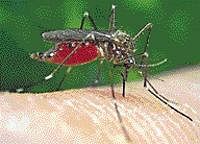

Of them, 58 cases were found to be positive. According to Health Officer Dr Shridhar, the patients are being treated and a team of doctors have camped at the villages and measures are taken to check further spread of the epidemic.
Directions are issued to the GPs to maintain sanitation and to supply clean drinking water, he said. Dr Sridhar has said that one case each of malaria fever was reported from Ramanelluru and Nagasandra in the taluk on Monday.
Causes, symptoms and preventive measures
* Malaria is caused by the bite by the female anopheles mosquito. Shaking chills, high fever, and sweating, fatigue, headache, dizziness, nausea, vomiting, abdominal cramps, dry cough, muscle or joint pain, and back ache are the symptoms of the disease. The attacks may occur every other day or every third day.
* Cerebral malaria and death can occur, sometimes within 24 hours, if the infection is caused by plasmodium falciparum.
* Fever or other symptoms can develop in malaria as early as 8 days or as late as 60 days after exposure or stopping prophylaxis.
* Malaria is among the main dangers of stagnant water, which can become a breeding ground for the mosquitoes that transmit these diseases.
* Stagnant water can be dangerous for drinking because it provides a better incubator than running water for mosquitoes.
* The water may be trapped in discarded cans, plant pots, tires, dug-outs, roofs hollow tree trunks, leaf sheaths, etc. nThis should be emptied. The collected water should be utilised withing seven days and the containers should be cleaned.
* The chlorination of public drinking supplies should be taken up.
* Maintain cleanliness to prevent mosquito breeding.
* Avoid mosquito bites. Mosquitoes bite particularly at twilight and at night, so you should take most precautions during this time.
* Sleep in rooms that are properly screened with gauze over the windows and doors. Use a mosquito net around the bed.